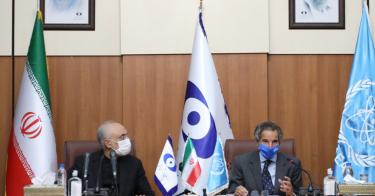President Joe Biden has signaled his willingness to revive the flawed 2015 Iran nuclear deal, the Joint Comprehensive Plan of Action (JCPOA). Doing so would reward a hostile dictatorship that has repeatedly reneged on its nonproliferation obligations and pocketed past concessions without moderating its aggressive foreign policy.
The U.S. cannot afford to return to the JCPOA because that deal did too little for too short a time to restrict Iran’s nuclear ambitions effectively.
Key JCPOA restrictions on uranium enrichment gradually sunset after 10 years and let Tehran expand its uranium enrichment activities to an industrial scale. This paves the way for a possible sprint to a nuclear breakout, if Tehran shrugs off its nonproliferation commitments—something it has done many times before.
The JCPOA was built on a foundation of Iranian deception. It contained inadequate verification provisions that allowed Iran to block U.N. inspectors at undeclared nuclear sites.
In 2018, an archive of Iran’s nuclear documents was stolen and revealed by Israel’s Mossad intelligence agency, exposing the fact that Iran never came clean about its past nuclear weapons efforts.
Iran seeks to resurrect the old deal with absolutely no modifications. Tehran is resorting to nuclear extortion, insisting on the old deal or no deal, despite the regime’s urgent need to have sanctions lifted.
If Washington fails to call this bluff and unwisely returns to the old deal, then Iran once again will pocket billions of dollars in sanctions relief, which it will plow back into its military buildup, network of proxy forces, or its nuclear program.
Although Washington should leave the door open for diplomacy, there should be no return to the JCPOA, which was flawed beyond redemption. A new and much more restrictive arrangement is needed to end Iran’s nuclear weapons ambitions permanently.
Iran’s beleaguered dictators are reeling from former President Donald Trump’s maximum-pressure sanctions strategy, internal divisions, and chronic anti-government protests. What is needed now is patience and firmness to get a better nuclear deal.
Any new agreement should include permanent restrictions on Iran’s nuclear activities, much stronger verification provisions, and restrictions on its ballistic missile program, an integral part of its nuclear weapons efforts.
There should be no lifting of sanctions merely for the promise of negotiations. If Tehran wants economic incentives, they should come in the form of a limited disbursement of its frozen assets, not in the suspension of sanctions, until Iran verifiably has fulfilled its commitments under a new agreement.
Washington should consult its regional allies in the course of negotiations. Reaching a sustainable nuclear agreement requires the buy-in of Israel and the gulf Arab states, which face the greatest threats from Iran. If they are not included, they will likely seek to sabotage the agreement or hedge their bets by building their own nuclear weapons options.
Any sustainable long-term agreement also requires bipartisan support in Washington. The Biden administration should not repeat the original sin of the Obama administration—trying to bypass Congress by structuring the deal as an executive agreement.
Any future nuclear deal should come in the form of a treaty to be approved by the Senate. Trying to do an end run around Congress will only boost the odds that the agreement will eventually collapse, as the last one did, when rejected by a new administration.
Iran never fully complied with the JCPOA, which constituted a diplomatic speed bump rather than a permanent barrier to its nuclear efforts. A much more restrictive agreement is required to dismantle Iran’s nuclear weapons program permanently and verifiably.
The Biden administration should exploit the strong bargaining position it inherited from the Trump administration’s maximum-pressure campaign and sanctions innovations to secure a more restrictive agreement.
Bowing to Tehran’s nuclear extortion and rushing to return to the defective JCPOA would only squander U.S. leverage, generate adverse regional consequences, and let Iran set the stage for an eventual nuclear breakout.
This piece originally appeared in Washington Times



